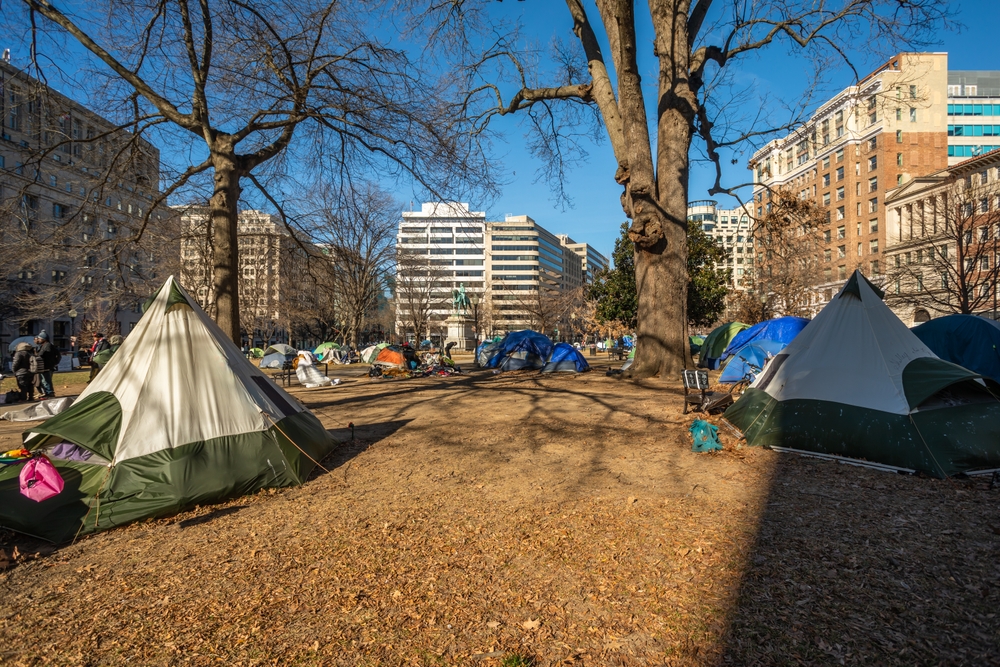According to several headlines, the Supreme Court has “criminalized homelessness” in a decision handed down in the last days of the Spring 2024 term. Others go even further. Not only has homelessness been criminalized, but poverty, too, apparently.
City of Grants Pass v. Johnson is an interesting case that picks up an issue that had been left unresolved in 2018, when the Supreme Court refused to hear an appeal from a federal appeals court that found that Boise, Idaho, officials could not enforce anti-camping ordinances when its homeless population exceeded the number of beds available in homeless shelters. The cases turn on whether criminal penalties for breaking these ordinances are cruel and unusual, and thereby violations of the U.S. Constitution’s Eighth Amendment. The Supreme Court had previously held that it is not constitutionally permissible to criminalize a status—i.e., being addicted to narcotics. But a government can criminalize acts, such as using narcotics.
In this case, and in the 2018 case that preceded it, those who argued against these laws insisted that camping or sleeping in public spaces criminalized acts that are unavoidable for those with a particular status. “For people with no access to shelter,” according to Justice Sotomayor in her dissent, “[the Grants Pass ordinance] punishes them for being homeless.”
Homelessness is a heartbreaking problem. In 2023, more than 650,000 people in the United States lacked permanent shelter, the highest number in our nation’s history. Many more are at risk of homelessness, including hundreds of thousands of children. It is an urgent issue—homeless people have a life expectancy 30 years shorter than the national average.
Not only is homelessness heartbreaking; it is also complex. There are as many paths to homelessness as there are homeless people, and it is not merely the availability of shelter that will solve the problem. Mental illness, trauma, drug use, poverty—the provision of free or affordable housing will never address these issues.
But has the Supreme Court literally criminalized homelessness? Such a claim is clearly designed to illicit an emotional response that substitutes the social complexities for the legal complexities that the Court was called upon to address in this case. But this case does present a rare circumstance in which a few important but otherwise unrelated issues intersect, and they are worthy of serious consideration.
First, the Eighth Amendment is one of the most tortured parts of the Constitution. A poll of ordinary Americans walking down the street would likely reveal that very few could identify the subject matter that the Eighth Amendment addresses, and an even smaller number could properly identify the text that it uses to address it. When the reference is casually dropped into an episode of Law & Order, for instance, the text almost always is quoted as “cruel and unusual punishment” rather than “cruel and unusual punishments” as found in the text of the Constitution itself.
It is a subtle, but important distinction, and the mistake is often found in judicial opinions, too, not just in Hollywood scripts. The plural form found in the Bill of Rights suggests a list of punishments found to be, as the text suggests, cruel and unusual. The singular form, the most common colloquial rendering, suggests a category of punishments that are by definition cruel and unusual. A category requires a test, and since the Constitution doesn’t provide one, the courts have been all too happy to do it. The test is called the “evolving standards of decency test,” which requires judges to appeal not to the text of the Constitution or a statute, nor even to the historical context of the amendment’s ratification, but to the opinion of the American people. Given that judges are appointed so as to be insulated from the influence of public opinion, it seems they are not well situated to be the best arbiters of it. This is the province of legislatures. Only Justice Clarence Thomas in his concurrence seems to have taken note of this.
Second, the issue of homelessness that underlies the substance of this case is, as mentioned above, a complex issue that is not solved merely by more housing.
But this doesn’t mean that housing crises do not play a role in this much larger problem.
One of the things that compounds the complexity of homelessness is that housing costs themselves are complicated. They’re impacted by myriad factors, many of which are overlooked and obfuscated by politicians and special interests. It is easy to assign blame for all the social ills that follow in the wake of gentrification, for example, on the middle-class residents of the new townhomes and high rises that have replaced less expensive, sometimes blighted neighborhoods. Which is not to say that we should not recognize with compassion those most vulnerable to rising housing and energy prices who ultimately become displaced from their homes and communities when prices rise as gentrification gains traction.
In fact, in 2010, New York’s most colorful gubernatorial candidate, Jimmy McMillan, attracted national media attention and was even spoofed on Saturday Night Live. His party, The Rent Is Too Damn High Party, was concerned with one and only one reality of life in New York—the fact that the rent was too damn high. In the end, Andrew Cuomo, who won the election, vindicated him: “I’m with Jimmy; the rent is too damn high.”
The housing problems in most of America’s large cities, it must be noted, are directly traceable to government regulation. Sometimes these regulations are designed to help alleviate these problems, but many times they are the result of special interests lobbying government to create schemes that enable both to benefit at a cost borne by taxpayers. Current and historic policies such as tax abatements, rent controls, redlining, urban planning, and other interventions consistently create more complexity and more expense. In fact, the average cost of a building permit in Manhattan to construct just one housing unit could buy an entire house in many parts of flyover country, where the housing markets are much less burdened with unnecessary regulations.
But all these considerations are large structural problems. They’ve taken years to ripen into the housing and related homelessness problems that cities like Grants Pass need to address today.
Our civic discourse has been taken over by what one commentator has called “rights talk.” We speak of rights in a casual, cavalier way without ever stopping to consider that every right implies a correlative duty. So a right to one’s property implies a duty on all others not to interfere with the property holder’s access to and enjoyment of that property. We apply this term far too freely, both in practice and in law, such that we not only enjoy many, many rights created by fiat but are also burdened by many, many duties unintentionally created in the process. It is a hard reality, but it is not altogether clear that anyone has a right to housing in the sense that anyone else has a duty to provide it. Whether any person, institution, or community has a moral duty rather than a legal duty to provide it is a different question entirely.
So, if cities do not ban camping in public spaces—for the homeless, for the Boy Scouts, and for commuters—does this mean that there is then a right to camp in these public spaces? As sympathetic as we should be to those among us without permanent shelter, is it unreasonable to expect that these public spaces should be available for soccer games, picnics, and dog walking?
Unfortunately, the root causes of homelessness are also the root causes of many antisocial behaviors that are threatening and dangerous. No one enjoys exposure to public urination, aggressive harassment, or intrusive and incoherent yelling. I’ve encountered all these things and more in nearly every city I’ve visited, and within just a few hundred yards of my front door in an urban area.
These things should move us to compassion, but they are also much more than any one of us can solve and far beyond the competency of government solutions. At a minimum, homelessness should not be a defense for behavior that is otherwise a disruption of the peace for the sake of the rights that all of us have to the enjoyment of public spaces, but also because low expectations of behavior will always invite lower standards of behavior. Sometimes a brush with the law is the only way for drug addicts or the mentally ill to move down the path toward substantive and effective help for their afflictions. Barring municipalities from imposing criminal penalties on the improper use of public spaces or antisocial behavior in public spaces for a certain class of person—namely those without shelter—does nothing but remove one of many tools that can ultimately be useful in helping homeless people and solving the complex and tragic problem of homelessness.

